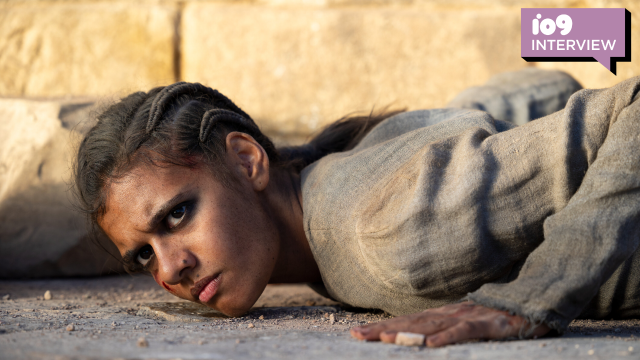Season two of Prime Video’s Wheel of Time had a lot of high-stakes fantasy storylines to explore—but none so moving or haunting as the ordeal of Egwene, played in the Robert Jordan adaptation by Madeleine Madden. io9 got a chance to speak to the actor about her character’s harrowing, powerful journey.
At the start of season one, Egwene is living a simple, quiet life in the remote Two Rivers region. Tragedy and fate set her and her friends on an epic quest to discover which among them is the Dragon Reborn—the person destined to fight the forces of evil and hopefully save the world. At the end of season one we learn Egwene’s not the chosen one—it’s Rand [Josha Stradowski], Egwene’s former sweetheart—a reveal that actually gives her license to become a far more interesting character.
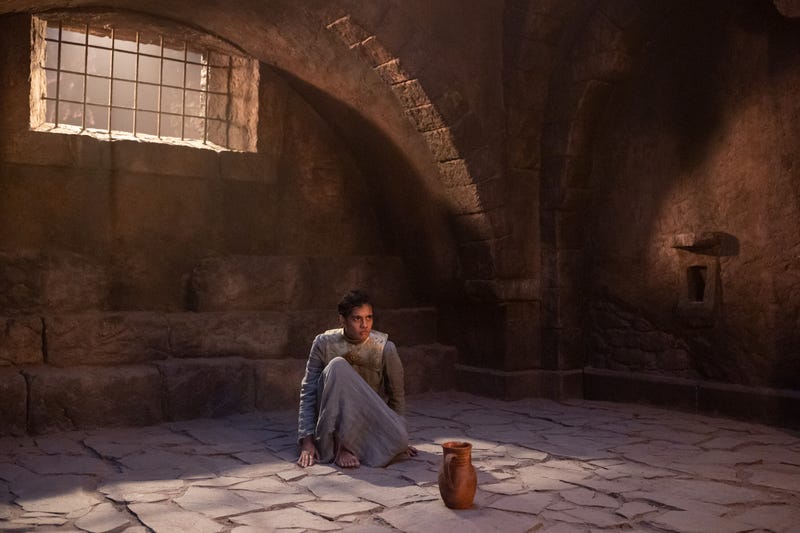
In season two, she becomes a novice with the Aes Sedai, a powerful magic sisterhood, and begins training her nascent powers—until she’s kidnapped by an invading army, the Seanchan, and becomes enslaved as a “damane,” or “leashed one.” She’s forced to wear a painful collar (called an “a’dam”) that prevents her from using magic of her own free will. She’s kept in a cell, or “kennel,” and must obey the commands of Renna (Xelia Mendes-Jones), who treats her with passive-aggressive cruelty and sometimes just plain cruelty, too. The situation builds to a startling confrontation, which we discussed with Madden in our interview below.
Cheryl Eddy, io9: Season two was incredibly physical for Egwene. What sorts of preparations did you have to undergo ahead of filming?
Madeleine Madden: I knew episode six [“Eyes Without Pity”] was coming up, and I knew that it was going to require a lot for me physically and emotionally. I was very lucky to work with Scarlett Mackmin, our fantastic movement coach, who was a massive support for me leading up to filming and during filming, in ways to warm up or cool down, stay physical, and the beats which we needed to hit. Also our director Maja [Vrvilo] really let me just play and leaned into whatever I had to offer. It’s a really important part of my process to look at art—whether it’s paintings, dance, or films; I found inspiration from the things that people are doing physically and where people sort of hold pain and torment and sorrow and grief in their body. I would really reflect on that, and also refer back to the books as well.
Robert Jordan has a fantastic way of writing with such detail; there was a lot in the books—even though it wasn’t one of the bigger parts of the book, there were still little nuggets of gold in there where I could be like, “Okay, this is where Egwene felt pain from the a’dam,” whether it was in her head or in her chest, or in body spasms. I really wanted to go all out to show the power that this thing could do, and the torment and torture that women go through. When you see Ryma [the Aes Sedai of the Yellow Ajah], get captured—and that’s on the back of seeing all of these horrific things that have happened to Egwene—that’s when you feel as an audience member that there are things worse than death in this world, and the breaking of these women is truly horrific. All of those women that you see that are damane have gone through a truly horrific time being collared.
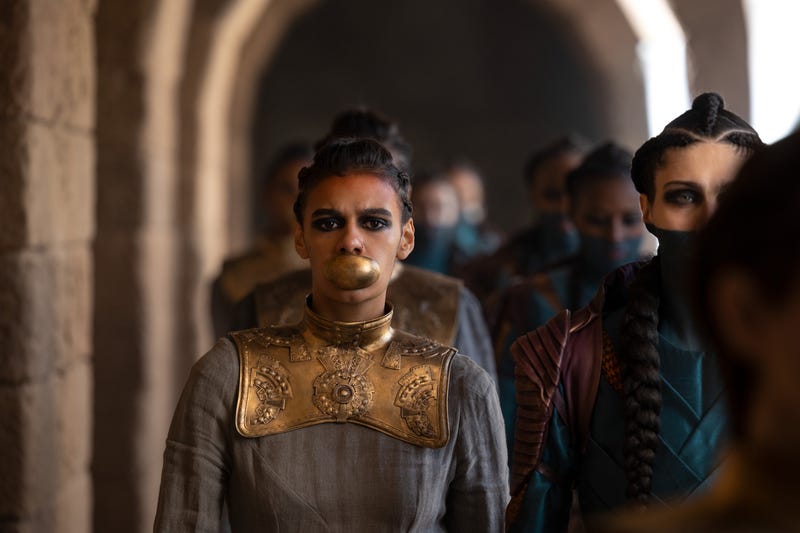
io9: You had to pull off some really heightened emotions using just your eyes. What was that experience like for you?
Madden: It was really difficult. In the [“Eyes Without Pity”] script—which, Rammy [Park] did a brilliant job; I just think she’s just one of the most fantastic writers, and was so lucky to be given an episode like that from her—it was very adamant that Egwene does not cry. She does not cry. She’s not crying, she’s not crying. And only at the end, when she touches that pitcher and has lost her sense of self and her sense of hope and strength, she cries and just breaks down in full grief. There were times when we were filming where I was just wanting to cry as an actor, and I had moments where I was crying and we couldn’t film because I was like, “I just need to take a minute because I need to let this come out of me and come back to it.” So I think that also plays into Egwene’s strength of how she really held on until the last minute of, like, even though she may be physically beaten and broken and sitting in the corner of the cell lifeless, she still holds so much strength internally. That final scene when she breaks down, that also felt very real for me. We shot chronologically— so we were lucky enough to film in order of sequence—so I could sort of go on that emotional and physical journey with Egwene.
io9: A lot of season two has other characters rushing to save Egwene, but in the end she’s able to free herself, though there’s a steep cost involved. What do you think she’s feeling in that moment when she kills Renna?
Madden: I think the relationship between Renna and Egwene is such a unique one, because through all of her brutality and torment, Renna taught Egwene just how special she really is and how strong she is. And Egwene no longer feels that she needs to prove herself to anyone anymore. She knows what she’s capable of and just how powerful she is. And it’s an interesting contrast with everyone saying “We need to save Egwene!” when really Egwene’s like, “The only way I’m getting out of this is if I save myself.” At the end, you don’t know whether Egwene is going to kill Renna or not, but we really just see how ruthless she’s become. She’s an entirely different beast now. And there are flickers throughout—when she’s on the tower, is she actually going to carry through with what the Dark wants her to do, just becoming this ruthless weapon of destruction that they can use? When she’s killing the White Cloaks, when she kills Renna, she has changed. She is darker, she is more ruthless. I think now she feels strong enough where she can protect her friends. She doesn’t need to look to other people now for strength and guidance. She is that for herself.
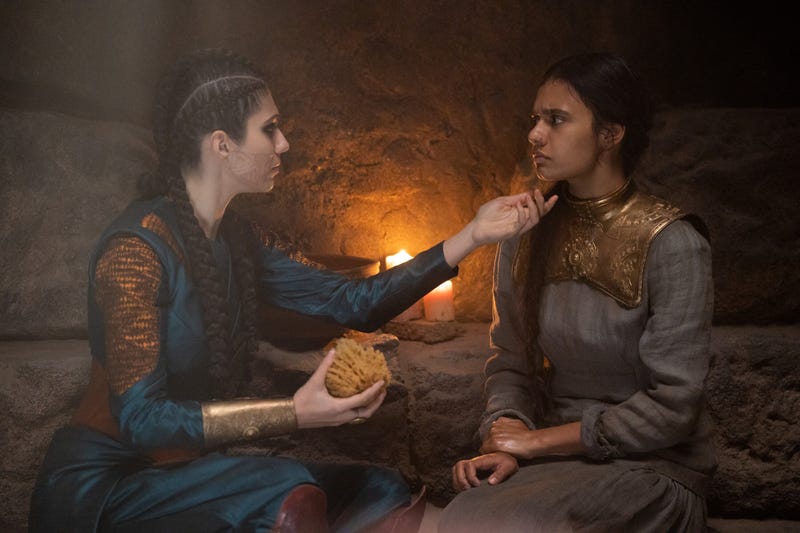
io9: In the finale, she has immediately go from that whole emotional situation to, “Oh, wait, my friends are here and I need to be with them in this other battle that’s happening.” Was that an especially rewarding scene to film, considering most of the cast was spread across different adventures for most of the season?
Madden: It’s so nice when we have moments like that because obviously we all go off on different storylines. I didn’t film with them for the entirety of the season. So when we do come back together, it does really feel like a homecoming and a reunion. But after Egwene kills Renna and Rand finds her on the tower, I think she’s just in a complete state of shock and trauma and doesn’t know if he’s actually real, because the past couple of months have just been a complete mind-bending experience. I think the recurring theme throughout this whole season—for all of the characters, for all of our heroes—is what they find out about themselves in their isolation. They find out who they really are, but then ultimately, they are strongest when they are together and they are fighting alongside of each other. They won’t be able to face and defeat the evil in this world if they aren’t standing unified.
io9: By the end of season two, Egwene is no longer that girl we met at the Two Rivers, and she’ll continue to evolve as we move into season three. What’s been the most surprising part of her journey so far for you?
Madden: I think just seeing really how determined she is and how strong she is. We’ve been told through [other] characters that “Egwene’s unbreakable, the unbreakable Egwene.” But I think we as an audience, and also as an actor, really see just what a tough little egg she is. Episode six is a big turning point for her. It was something that I was really ready for as an actor. I think even Egwene was sick of feeling dependent on people and reliant on people and needing their guidance or approval. Here in this moment, in this episode, she was powerful for herself. She saved herself for herself. She was strong for herself. And she’s forever changed because of this experience. This time being a damane will have [an effect] on her for the rest of her life, and also her relationship with authority and figures of authority, and institutions that represent authority and control in the world.
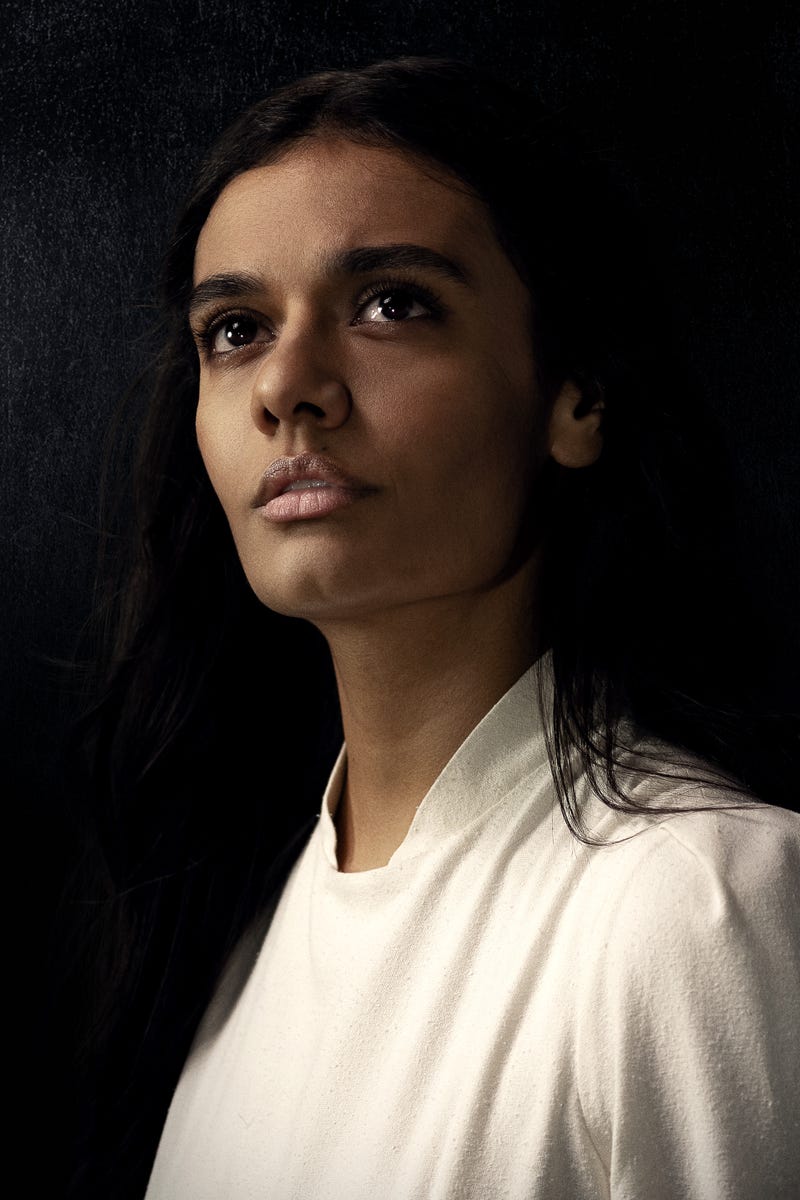
Seasons one and two of The Wheel of Time are now streaming on Prime Video; a third season is on the way.
